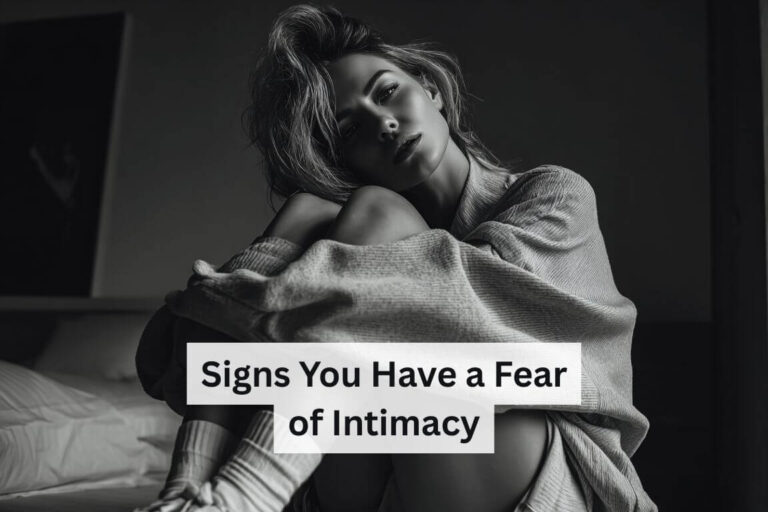Love is supposed to feel safe, warm, and fulfilling. Yet for many women, the closer someone gets, the more uncomfortable things become
If you find yourself pulling back just when relationships start to deepen, or creating distance when someone shows genuine care, you might be dealing with something more complex than simple nervousness.
Fear of intimacy can quietly sabotage even the most promising connections, leaving you wondering why love feels so challenging.
Understanding these patterns is the first step toward breaking free from the invisible barriers that keep you from the closeness you truly deserve.
1. You Keep Your Heart Behind Glass Walls
The most telling sign of intimacy fears shows up in how carefully you guard your inner world. While everyone has boundaries, you might find yourself treating emotions like classified information.
When conversations turn personal, you redirect them. When someone asks how you’re really feeling, you offer surface-level responses or change the subject entirely.
This emotional distance often feels safer than the alternative. Sharing your authentic thoughts, fears, and dreams requires vulnerability, and vulnerability can feel terrifying when you’re wired to protect yourself.
You might catch yourself deflecting compliments, downplaying your achievements, or keeping conversations focused on everyone else but you.
The challenge here isn’t that you don’t want connection. You crave it deeply. But somewhere along the way, you learned that showing your true self might lead to judgment, rejection, or pain.
So you present a carefully curated version of yourself, keeping the messy, beautiful, complicated parts locked away where they can’t be hurt.

2. You Choose Partners Who Can’t Quite Reach You
There’s an unconscious pattern many people with intimacy fears fall into: consistently choosing partners who are emotionally unavailable.
These might be people who are commitment-phobic, still hung up on their ex, focused entirely on their career, or simply not ready for anything serious.
While this might seem counterproductive if you want love, it actually serves a protective function. When your partner can’t fully commit, you’re off the hook too.
You can tell yourself you want more while knowing deep down that you’re safe from having to open up completely. It’s a way of wanting intimacy without actually having to risk it.
You might notice this pattern showing up repeatedly. The people who pursue you most genuinely, who offer stability and emotional availability, somehow feel wrong or boring.
Meanwhile, you find yourself drawn to those who keep you guessing, who maintain just enough distance that you never have to fully let them in.
3. You Sabotage Good Things Before They Get Too Real
When relationships start progressing naturally toward deeper commitment, something inside you hits the panic button.
You might find yourself picking fights over small things, suddenly noticing flaws that didn’t bother you before, or creating drama where none existed.
This self-sabotage often happens right when things are going well, which can be confusing for both you and your partner.
The better things get, the scarier they become. Your mind starts playing out worst-case scenarios. What if they discover you’re not as amazing as they think?
What if they leave once they really know you? What if you get too attached and end up devastated? Sometimes it feels easier to end things yourself rather than risk being hurt later.
This pattern can also show up as suddenly becoming extremely busy with work, friends, or hobbies when your partner wants to spend more quality time together.
You might cancel dates, avoid making future plans, or find reasons why the relationship “just isn’t working” right when your partner is ready to take things to the next level.
4. You Turn Independence Into a Fortress
Independence is healthy and attractive, but when taken to extremes, it becomes a way to avoid needing anyone.
You pride yourself on handling everything alone, rarely asking for help even when you desperately need it. The idea of relying on someone else feels uncomfortable or even dangerous.
This shows up in small ways and big ones. You’d rather struggle with heavy groceries than ask your partner to help.
You work through illness alone instead of letting someone take care of you. You’ve become so self-reliant that accepting support feels like weakness rather than natural partnership.
The challenge is that true intimacy requires some level of interdependence. It means being comfortable with needing someone and letting them need you back.
When you’re determined to need nothing from anyone, you inadvertently create distance in relationships that could otherwise flourish.
5. You Feel Unworthy of Real Love
Deep down, there’s a voice that questions whether you deserve the kind of love you see in movies or read about in books.
This might stem from past experiences, childhood messages, or simply a harsh inner critic that’s never learned to be kind.
You might accept partners who treat you poorly because it aligns with what you believe you deserve.
When someone does treat you well, shows genuine affection, or expresses deep feelings for you, it feels foreign.
You might find yourself waiting for the other shoe to drop, convinced they’ll realize their “mistake” and leave.
Compliments feel uncomfortable because they clash with your internal narrative about your worth.
This unworthiness can also manifest as perfectionism in relationships. You exhaust yourself trying to be the “perfect” partner, believing that if you slip up or show any flaws, the person will inevitably lose interest.
The pressure to maintain this impossible standard creates distance because your authentic, imperfect self never gets to show up.

6. You Keep Relationships on the Surface
Even in long-term relationships, you might find that conversations rarely go deeper than day-to-day logistics, shared interests, or light topics.
You’re great at talking about work, current events, or mutual friends, but discussions about feelings, future dreams, or personal struggles feel awkward or forced.
This surface-level connection might feel comfortable, but it can leave both you and your partner feeling like something important is missing.
You might have many acquaintances but struggle to develop truly close friendships or romantic connections where you feel fully known and accepted.
The irony is that while surface-level interactions feel safer, they also feel empty over time. You end up in relationships where you care about each other but don’t really know each other in any meaningful way.
This creates a different kind of loneliness, one where you’re surrounded by people but still feel fundamentally alone.
7. You Panic When Love Gets Real
Perhaps the most telling sign is what happens when someone expresses genuine, deep feelings for you.
Instead of joy or excitement, you feel anxiety, claustrophobia, or an overwhelming urge to run. The very thing you thought you wanted suddenly feels too intense, too much, too scary.
This panic can show up physically. Your heart races, your palms sweat, or you feel like you can’t breathe when someone tells you they love you.
You might find yourself making jokes to deflect the moment, changing the subject, or finding excuses to leave. The closer someone gets to your heart, the louder your alarm bells become.
The tragedy is that this reaction often kicks in precisely when you’re receiving what you’ve been longing for.
Someone sees you, values you, and wants to build something real with you, but instead of feeling grateful or excited, you feel trapped. It’s like being afraid of the very thing you’re hungry for.
Fear of intimacy isn’t a life sentence; it’s often a protective mechanism that once served you but has outlived its usefulness.
Recognizing these signs in yourself is the first step toward healing and creating the authentic, fulfilling relationships you truly desire.
The journey toward deeper connection takes courage, patience, and often professional support.
But the reward is worth it: relationships where you can be fully yourself, love without constant fear, and experience the profound joy of being truly known and cherished for exactly who you are.


